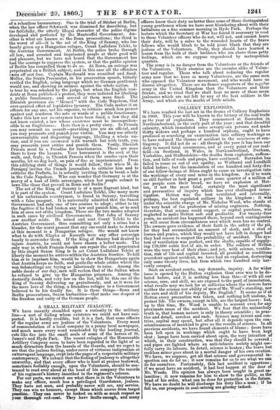A SMALL MILITARY JEALOUSY.
Wu have recently stumbled upon a curiosity in the military, line—a sort of feeling whose existence we could not have sus- pected. It is hardly credible, but it is a fact, that some officers of the regular army are jealous of the Volunteers. Every word of commendation of a local company in a penny local newspaper, and much more every word vouchsafed by the leading journal, eats like fire into the small souls of some of the heroes of St. James's and Hyde Park. The recent eulogies of the Honourable Artillery Company seem to have been regarded in the light of so much detraction from the laurels of the Guards, and we regret to see that the jealous feeling, under cover of virtuous indignation at extravagant language, crept into the pages of a respectable military contemporary. We submit that the feeling of jealousy is altogether unworthy, and that every officer who is hurt at praises bestowed, sometimes foolishly enough, upon the Volunteers, should be sen- tenced to read over aloud at the head of his company the records of his regiment's history inscribed in the regiment's colours. For our parts, we cannot see what there is in the Volunteers to make any officer, much less a privileged Guardsman, jealous. They have not seen, and probably never will see, any service. They can win no honours, except those which accrue from target practice. They can never be looked on with so much respect as your thorough red-coat. They have faults enough, and many
officers know their duty no better than some of those distinguished young gentlemen whom we have seen blundering about with their battalions on a fine summer morning in Hyde Park. Perhaps the lecture which the Secretary at War has found it necessary to read to those Volunteer officers who do not, will not, and cannot learn their duty, will be a salve to the wounded hearts of the bravo fellows who would blush to be told point blank that they are jealous of the Volunteers. Truly, they should have learned a lesson from the bulk of their brethren who are above those petty feelings, which are we suppose engendered by metropolitan quarters. The army is in no danger from the Volunteers or the friends of the Volunteers. Their enemies are the enemies alike of Volun- teer and regular. Those who talk about reducing the regular army now that we have so many Volunteers, are the same men who opposed the Volunteer movement, and who would have us disarm altogether. There are no firmer supporters of the regular army in the United Kingdom than the Volunteers and their friends, and we trust that we shall hear no more of those mean jealousies which are not felt by any of the best soldiers in the Army, and which are the mark; of little minds.


























 Previous page
Previous page